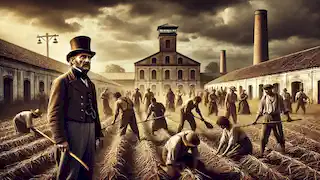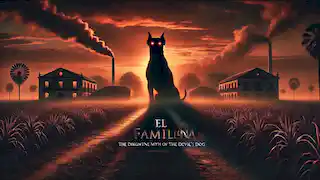In the heart of Argentina's northern provinces, where the dense forests meet sprawling sugar plantations, there exists a legend so dark and sinister that it has terrified generations. This is the tale of "El Familiar," a creature born of both fear and necessity, a symbol of the ruthless exploitation that marked the history of sugar production in the region. As the sun sets over the verdant fields, and shadows begin to stretch their long fingers across the land, the whispers of El Familiar grow louder, creeping into the minds of those who dare to listen. The legend of El Familiar is deeply rooted in the history of the sugar plantations in the provinces of Tucumán, Salta, and Jujuy. In the late 19th and early 20th centuries, the demand for sugar surged, and the industry boomed. To meet this demand, plantation owners exploited their workers, often subjecting them to brutal conditions. The owners, wealthy and powerful, would do anything to protect their fortunes. It is said that in their greed, they made a pact with the devil himself. El Familiar, according to the legend, is a large, black dog with glowing red eyes and sharp fangs. Some say it resembles a jaguar or a monstrous hybrid of different animals. The creature is believed to be an agent of the devil, a guardian sent to watch over the plantation owners' wealth. But El Familiar is no mere watchdog; it demands a dark price for its services—human souls. The story goes that the plantation owners, desperate to maintain their wealth and power, summoned the devil and offered their souls in exchange for prosperity. The devil, always eager to claim more souls, agreed to the pact. In return, he sent El Familiar to patrol the plantations. The creature would ensure that the sugar production ran smoothly, that no workers dared to rebel, and that the owners' wealth remained untouched. But there was one catch—El Familiar had to be fed. Every year, on the night of the harvest's completion, a sacrifice had to be made. A worker, chosen by the plantation owner, would be led into the fields, never to return. The next morning, the workers would find nothing but the remnants of the victim, blood-soaked earth, and the lingering scent of sulfur. It was a gruesome reminder of the power of the plantation owner and the dark forces at play. For the workers, life on the sugar plantations was a mix of fear and desperation. They labored from dawn till dusk, their bodies broken by the relentless work. The threat of El Familiar loomed over them like a dark cloud. Every year, as the harvest approached, the tension among the workers grew. No one wanted to be the next victim, but they knew there was little they could do to escape their fate. The foremen, loyal to the plantation owners, would often use the threat of El Familiar to keep the workers in line. Any sign of rebellion or disobedience was met with the ominous warning: "El Familiar will come for you." The workers had seen enough evidence of the creature's existence to believe the threat was real. The mangled bodies, the strange tracks in the dirt, and the terrifying howls that echoed through the night were proof enough. The fear of El Familiar was so pervasive that it seeped into every aspect of life on the plantation. Children were told to behave, or El Familiar would take them away. Workers refused to venture into the fields after dark, and even the bravest men spoke in hushed tones when discussing the creature. The plantation owners, aware of the terror they had unleashed, used it to their advantage, ensuring that their wealth continued to grow while the workers lived in constant fear. But the legend of El Familiar did more than just keep the workers in line; it created an atmosphere of paranoia and mistrust. No one knew who would be chosen as the next sacrifice, and this uncertainty bred suspicion. Workers began to distance themselves from one another, afraid that any sign of weakness or defiance would make them the next target. Friendships dissolved, and the sense of community that had once existed among the workers crumbled. Despite the overwhelming fear, whispers of rebellion began to circulate among the workers. The harsh conditions, the endless labor, and the constant threat of El Familiar had pushed them to the brink. Some of the younger workers, less inclined to believe in the old superstitions, began to question the power of the plantation owners and the reality of El Familiar. They spoke of resistance, of banding together to overthrow their oppressors. The plantation owners, ever vigilant, soon caught wind of these rebellious murmurs. They knew that fear alone might not be enough to keep the workers in check. And so, they decided to make an example of someone. The annual harvest was approaching, and the owners needed to remind the workers of the power they wielded—both their own and that of the creature that served them. As the night of the harvest's completion drew near, the plantation owners gathered to choose the sacrifice. This year, they decided to target one of the young workers who had been vocal about resisting the status quo. The chosen victim was a young man named Mateo, known for his strength and defiance. He had been a thorn in the side of the plantation owners, encouraging others to question their authority and the existence of El Familiar. On the night of the harvest, Mateo was taken from his bed by the foremen and dragged into the fields. The other workers, hearing his cries, were paralyzed with fear. They knew what was happening but were powerless to stop it. As Mateo was led away, he shouted to his fellow workers, urging them to rise up and fight, but his words were drowned out by the howling wind and the ominous growl of El Familiar. According to the legend, Mateo's encounter with El Familiar was unlike any that had come before. As he was thrown to the ground in the middle of the darkened fields, he saw the creature emerge from the shadows. It was larger than any dog he had ever seen, its fur as black as the night, and its eyes burning with an unnatural fire. But Mateo did not cower. Instead, he stood tall, facing the beast with a defiance that few had ever shown. The creature circled him, its growls reverberating through the night, but Mateo did not flinch. He continued to shout his defiance, calling out the plantation owners and challenging the power of the creature before him. And then, something unexpected happened. The creature paused, as if considering Mateo's words. The air grew still, and for a moment, it seemed as if time itself had stopped. The legend tells that in that moment, Mateo made a desperate decision. He reached into his pocket and pulled out a small, handmade cross—a symbol of his faith and his hope. Holding it high, he confronted El Familiar, chanting a prayer that his grandmother had taught him as a child. The creature, seemingly affected by the symbol, recoiled. For the first time in its existence, El Familiar hesitated. But the power of the plantation owners and their pact with the devil was strong. The ground beneath Mateo began to tremble, and a dark force seemed to rise from the earth itself. The cross in Mateo's hand began to burn, and he cried out in pain. Yet, he did not drop it. He continued to hold it aloft, even as his flesh sizzled and the air filled with the smell of burning wood and skin. In the end, the legend says that Mateo's strength and defiance were not enough to overcome the dark forces that controlled El Familiar. The creature, sensing the will of its masters, lunged at Mateo, and the night was filled with the sound of tearing flesh and the young man's final, agonized screams. By morning, there was nothing left of him but a blood-stained cross and a patch of scorched earth. But something had changed that night. The other workers, who had witnessed Mateo's defiance, began to question the power of the plantation owners and the legend of El Familiar. They saw that the creature could be challenged, that it was not invincible. Mateo's death, though tragic, became a symbol of resistance. In the years that followed, the legend of El Familiar continued to haunt the sugar plantations, but its power began to wane. The workers, inspired by Mateo's bravery, started to organize. They spoke out against the injustices they faced and began to demand better conditions. The plantation owners, sensing that their grip on power was slipping, tried to tighten their control, but the tide was turning. El Familiar, once a feared and respected force, became a symbol of the plantation owners' tyranny rather than their power. The legend continued to evolve, with new stories emerging about workers who had stood up to the creature and survived. These tales spread throughout the region, inspiring others to resist their oppressors. As the sugar industry in northern Argentina declined in the mid-20th century, so too did the legend of El Familiar. The plantations, once thriving centers of wealth and power, became relics of a bygone era. The workers, many of whom had moved on to other opportunities, carried with them the stories of their ancestors' struggles. The legend of El Familiar became a cautionary tale, a reminder of the dark history of exploitation and the power of resistance. In the end, the story of El Familiar is not just about a monstrous creature that terrorized the sugar plantations of Argentina. It is a story about the human spirit, about how fear can be used as a tool of oppression but also how that same fear can be overcome through courage and unity. The legend of El Familiar, while terrifying, ultimately became a symbol of the workers' resilience and their refusal to be dominated by the forces that sought to control them. Over time, the story of El Familiar took on new meanings. As generations passed, the creature that once instilled terror in the hearts of workers became a figure of folklore, a subject of campfire tales rather than a genuine threat. The legend was passed down from parents to children, but with each retelling, it lost some of its potency. What was once a real and immediate fear became more of a moral lesson, a way to teach children about the dangers of greed and the importance of standing up for what is right. The figure of El Familiar also began to evolve. In some versions of the story, the creature was no longer a mere agent of the devil, but a tragic figure itself—cursed by its pact with the devil and bound to serve the whims of evil men. This version of the legend added a layer of complexity to the tale, suggesting that even the darkest forces could be victims of circumstance. In modern times, El Familiar is remembered more as a part of Argentina's rich cultural heritage than as a real threat. The sugar plantations, many of which have been abandoned or transformed into different kinds of farms, are now historical sites where the legend of El Familiar is told to tourists and schoolchildren. The creature's image has been adapted into local art and folklore festivals, where it is celebrated as a symbol of the region's history and identity. However, the underlying message of the legend—about the dangers of unchecked power and the strength of collective resistance—remains relevant. In a world where inequality and exploitation still exist, the story of El Familiar serves as a reminder of the past struggles and the importance of continuing to fight for justice. The legend of El Familiar has left an indelible mark on the cultural landscape of northern Argentina. It has shaped the way people understand their history and their relationship with the land and the forces that have shaped it. For the descendants of those who worked the sugar plantations, the story of El Familiar is a connection to their ancestors' struggles and a testament to their resilience. Even today, as the world changes and the old ways of life fade into memory, the legend of El Familiar persists. It is a story that has transcended its origins, becoming a part of the collective consciousness of the region. And as long as there are people to tell the tale, the legend of El Familiar will continue to haunt the fields of northern Argentina, a reminder of a time when the line between myth and reality was not so clear. The tale of El Familiar is a chilling reminder of the power that fear holds over us, and how it can be used both as a tool of oppression and as a catalyst for resistance. The legend is more than just a story about a monstrous dog; it is a reflection of the social and economic conditions of the time, the desperation of the workers, and the lengths to which those in power would go to maintain their control. But ultimately, the story is about the triumph of the human spirit. Mateo's defiance, though it cost him his life, planted the seeds of resistance in the hearts of his fellow workers. The legend of El Familiar, while rooted in fear, became a symbol of hope and the belief that even the most terrifying forces can be challenged. And in that sense, the legend lives on, not just in the fields of Argentina, but in the hearts of all who hear the tale.The Origins of the Legend
The Pact with the Devil

Life on the Plantations
The Fear Takes Hold

A Rising Rebellion
The Chosen Sacrifice
The Encounter with El Familiar
The Twist of Fate
The End of Mateo
The Aftermath

The Decline of the Legend
The Transformation of the Legend
The Modern Myth
The Lasting Impact

Conclusion
El Familiar: The Argentine Myth of the Devil’s Dog
Reading Time: 12 min

About Story: El Familiar: The Argentine Myth of the Devil’s Dog is a Legend Stories from argentina set in the 19th Century Stories. This Dramatic Stories tale explores themes of Courage Stories and is suitable for Adults Stories. It offers Cultural Stories insights. A chilling tale of fear, greed, and the courage to resist.


















